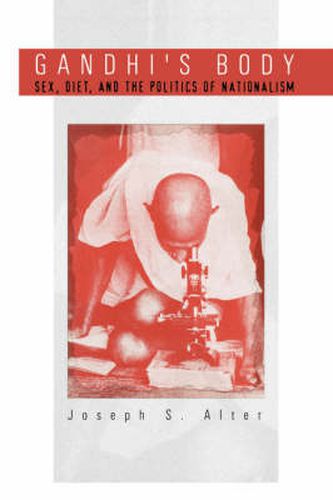Readings Newsletter
Become a Readings Member to make your shopping experience even easier.
Sign in or sign up for free!
You’re not far away from qualifying for FREE standard shipping within Australia
You’ve qualified for FREE standard shipping within Australia
The cart is loading…






No single person is more directly associated with India and India’s struggle for independence than Mahatma Gandhi. His name has equally become synonymous with the highest principles of global equality, human dignity, and freedom.
Joseph Alter argues, however, that Gandhi has not been completely understood by biographers and political scholars, and in Gandhi’s Body he undertakes a reevaluation of the Mahatma’s life and thought. In his revisionist and iconoclastic approach, Alter moves away from the usual focus on nonviolence, peace, and social reform and takes seriously what most scholars who have studied Gandhi tend to ignore: Gandhi’s preoccupation with sex, his obsession with diet reform, and his vehement advocacy for naturopathy. Alter concludes that a distinction cannot be made between Gandhi’s concern with health, faith in nonviolence, and his sociopolitical agenda.
In this original and provocative study, Joseph Alter demonstrates that these seemingly idiosyncratic aspects of Gandhi’s personal life are of central importance to understanding his politics-and not only Gandhi’s politics but Indian nationalism in general. Using the Mahatma’s own writings, Alter places Gandhi’s bodily practices in the context of his philosophy; for example, he explores the relationship between Gandhi’s fasting and his ideas about the metaphysics of emptiness and that between his celibacy and his beliefs about nonviolence.
Alter also places Gandhi’s ideas and practices in their national and transnational contexts. He discusses how and why nature cure became extremely popular in India during the early part of the twentieth century, tracing the influence of two German naturopaths on Gandhi’s thinking and on the practice of yoga in India. More important, he argues that the reconstruction of yoga in terms of European naturopathy was brought about deliberately by a number of activists in India-of whom Gandhi was only the most visible-interested in creating a scientific health regimen, distinct from Western precedents, that would make the Indian people fit for self-rule. Gandhi’s Body counters established arguments that Indian nationalism was either a completely indigenous Hindu-based movement or simply a derivative of Western ideals.
$9.00 standard shipping within Australia
FREE standard shipping within Australia for orders over $100.00
Express & International shipping calculated at checkout
No single person is more directly associated with India and India’s struggle for independence than Mahatma Gandhi. His name has equally become synonymous with the highest principles of global equality, human dignity, and freedom.
Joseph Alter argues, however, that Gandhi has not been completely understood by biographers and political scholars, and in Gandhi’s Body he undertakes a reevaluation of the Mahatma’s life and thought. In his revisionist and iconoclastic approach, Alter moves away from the usual focus on nonviolence, peace, and social reform and takes seriously what most scholars who have studied Gandhi tend to ignore: Gandhi’s preoccupation with sex, his obsession with diet reform, and his vehement advocacy for naturopathy. Alter concludes that a distinction cannot be made between Gandhi’s concern with health, faith in nonviolence, and his sociopolitical agenda.
In this original and provocative study, Joseph Alter demonstrates that these seemingly idiosyncratic aspects of Gandhi’s personal life are of central importance to understanding his politics-and not only Gandhi’s politics but Indian nationalism in general. Using the Mahatma’s own writings, Alter places Gandhi’s bodily practices in the context of his philosophy; for example, he explores the relationship between Gandhi’s fasting and his ideas about the metaphysics of emptiness and that between his celibacy and his beliefs about nonviolence.
Alter also places Gandhi’s ideas and practices in their national and transnational contexts. He discusses how and why nature cure became extremely popular in India during the early part of the twentieth century, tracing the influence of two German naturopaths on Gandhi’s thinking and on the practice of yoga in India. More important, he argues that the reconstruction of yoga in terms of European naturopathy was brought about deliberately by a number of activists in India-of whom Gandhi was only the most visible-interested in creating a scientific health regimen, distinct from Western precedents, that would make the Indian people fit for self-rule. Gandhi’s Body counters established arguments that Indian nationalism was either a completely indigenous Hindu-based movement or simply a derivative of Western ideals.